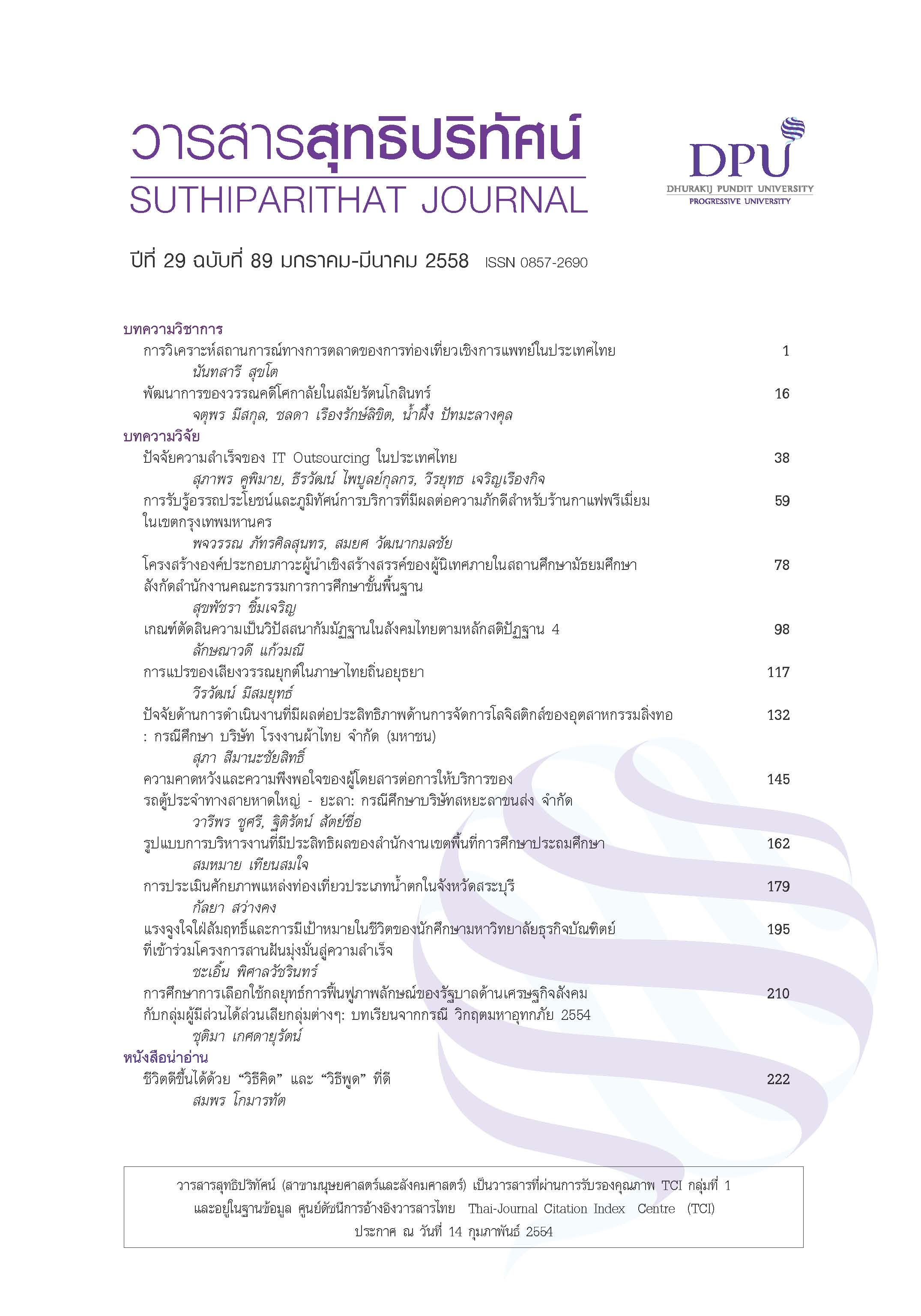ปัจจัยความสำเร็จของ IT Outsourcing ในประเทศไทย
คำสำคัญ:
ความสำเร็จของ IT Outsourcing, ตลาดหลักทรัพย์แห่งประเทศไทยบทคัดย่อ
การวิจัยครั้งนี้มีจุดประสงค์เพื่อศึกษาและค้นหาปัจจัยที่เกี่ยวข้องกับความสำเร็จของการจัดจ้างงานภายนอกด้านเทคโนโลยีสารสนเทศ โดยใช้วิธีการวิจัยแบบเชิงปริมาณ ข้อมูลในการวิจัยได้มาจากการเก็บแบบสอบถามจากบริษัทที่จดทะเบียนในตลาดหลักทรัพย์แห่งประเทศไทย จำนวน 232 บริษัท การวิเคราะห์ข้อมูลโดยใช้วิธีการวิเคราะห์สมการโครงสร้าง (SEM) ซึ่งได้ค่า Chi-square = 51.738, df = 45, P-value = 0.227, RMSEA = 0.025, GFI = 0.974, AGFI = 0.921, NFI = 0.977, และ CIF= 0.997 ผลการศึกษา พบว่า คุณภาพการบริการ ความสามารถของผู้ให้บริการ คุณภาพความสัมพันธ์ ความสำเร็จของ IT Outsourcing และความพึงพอใจของลูกค้ามีความคิดเห็นอยู่ในระดับมาก คุณภาพการบริการและคุณภาพความสัมพันธ์สามารถร่วมกันทำนายความแปรปฐวนของความสำเร็จของ IT Outsourcing ได้ร้อยละ 75 ในขณะที่ความสามารถของผู้ให้บริการไม่มีผลต่อความสำเร็จของ IT Outsourcing และความสามารถของผู้ให้บริการสามารถทำนายความแปรปรวนของความพึงพอใจของลูกค้าได้ร้อยละ 45 ผลการศึกษาสอดคล้องกับทฤษฎีการแลกเปลี่ยนทางสังคม ซึ่งอธิบายการมีปฏิสัมพันธ์กันระหว่างหุ้นส่วน โดยเน้นถึงกระบวนการทางสังคมของการให้และการรับมุ่งทำความเข้าใจต่อพฤติกรรมของแต่ละฝ่ายสนับสนุนต่อการแลกเปลี่ยนภายใต้หลักธรรมาภิบาล
เอกสารอ้างอิง
Chakrabarty, S., Whitten, D. & Green, K. (2007). Understanding service quality and relationship quality in IS outsourcing: Client orientation & promotion, project management effectiveness and the task-technology-structure fit. Journal of Computer Information Systems, 48(2), 1-15.
Claver, E., Gonzalez, R., Gasco, J. &Llopis, J., (2002). Information systems outsourcing: reasons, reservations and success factors. Logistics Information Management, 15(4).
Cong, Q. & Chau, P. Y. K. (2010). Relationship and Contract Issues of IT Outsourcing – Descriptive Case Studies in China Regions. Pacific Asia Conference on Information Systems.
Gau, J . M. (2011). The Convergent and Discriminant Validity of Procedural Justice and Police Legitimacy: An Empirical Test of Core Theoretical Propositions. Journal of Criminal Justice, 39, 489–498.
Goles, T. (2003).Vendor capabilities and outsourcing success. Wirtschaftsinformatik, 45(2), 199–206.
Goles, T., & Chin, W. W. (2005). Information systems outsourcing relationship factors: detailed conceptualization and initial evidence. The DATA BASE for Advances in Information Systems, 36(4), 47–67.
Govindarajan, M. (2007). Marketing Management: Concepts, Cases, Challenges and Trends, (2nd ed). New Delhi: Prentice-Hall of India Private Limited.
Hair, J. F. Jr., Black, W. C., Babin, B. J., & Anderson, R. E. (2010). Multivariate data analysis (7th ed). Upper Saddle River, NJ: Prentice Hall.
Han, H. S., Lee J.N., Chun, J. U. & Seo, Y.W. (2013). Complementarity between client and vendor IT capabilities: An empirical investigation in IT outsourcing projects. Decision Support Systems, 55, 777–791.
Han, H.-S., Lee, J.-N., & Seo, Y.-W. (2008). Analyzing the impact of a firm’s capability on outsourcing success: a process perspective. Information & Management, 45(1), 31–42.
Hirschheim, R., Heinzl, A. & Dibbern, J. (Eds.). (2006). Information Systems Outsourcing: Enduring Themes, New Perspectives and Global Challenges. (2nd ed). New York: Springer-Verlag.
Hoffman, K. D. & Bateson, J. E. G. (2010). Services Marketing Concepts, Strategies, & Cases, (4th ed). Australia: South- Western Cengage Learning.
Hooper, D., Coughlan, J., & Mullen M. (2008). Structural Equation Modeling: Guide lines for Determining Model Fit. Published in the Electronic Journal of Business Research Methods 6(1), 53-60.
Kern, T. (1997). The gestalt of an information technology outsourcing relationship: an exploratory analysis. Oxford University.
Krejcie, R. V. & Morgan, D. W. (1970). Determining Sample Size for Research Activities. Educational and Psychological Measurement.
Landrum, H., & Prybutok, V.R. (2004). A service quality and success model for the information service industry. European Journal of Operational Research, 156, 628–642.
Lee, J.N., Huynh, M. Q., Chi-wai, K. R., & Pi, S.M. (2000). The Evolution of Outsourcing Research: What is the Next Issue? Proceedings of the 33rd Hawaii International Conference on System Sciences.
Lee, J. N., Han, H. S., Lee, J., & Seo, Y.W. (2009). The Fit between Client IT Capability and Vendor Competence and Its Impact on Outsourcing Success. Americas Conference on Information Systems (AMCIS) Proceedings.
Lee, Y. K.A. & Kozar, K. A. (2006). Investigating the effect of website quality on e-business success: An analytic hierarchy process (AHP). Approach Decision Support Systems, 42, 1383–1401.
Levina, N. & Ross J.W., (2003) From the vendor’s perspective: exploring the value proposition in information technology outsourcing. MIS Quarterly, 27(3), 331–364.
Lovelock, C.H. & Wirtz, J. (2004). Services Marketing People, Technology, Strategy. (5th ed). Pearson Education International: Pearson Prentice Hall.
Naude & Buttle. (2000). Assessing Relationship. Industrial Marketing Management, 29, 351–361.
Mao, J. Y., Lee J.N., & Deng, C. P. (2008). Vendors’ perspectives on trust and control in offshore information systems outsourcing. Information and Management, 45, 482–492.
Madura, J. (2007). Introduction to business, (4 th). Australia: Thomson South-Western.
Mohamed, N., Ismail, Z., Hussin, H. & Hussein, R. (2007). Perceived Service Quality, Relationship Quality, and IT outsourcing success in Malaysian Organizations. IRMA International Conference.
Parasuraman, A., & Zeithaml, V. A. (1985). A conceptual Model of service Quality and its Implications for future research. Journal of marketing, 49, 41-50.
Powell, T. C. (1992), Organizational Alignment as Competitive Advantage. Strategic Management Journal, 13 (February), 119-134.
Qi, C. & Chau, P. Y. K. (2012). Relationship and contract issues of IT outsourcing An empirical study in China. Proceedings of the 18th Americas Conference on Information Systems.
Snir, E. M., & Hitt, L. M. (2004). Vendor screening in information technology contracting with a pilot project. Journal of Organizational Computing and Electronic Commerce 4(1), 61-88.
Song, H. M. & Wong, S. F. (2009). Understanding Customer Satisfaction in the IT Outsourcing Environment: A Classification of Quality Attributes. Journal of Outscoring and Organizational Information Management.
Sparrow, E. (2003). Successful IT Outsourcing: From choosing a provider to managing the project. London: Springer-Verlag.
Sundar, G. (2008). Business Process Outsourcing - Determinants of Success. Unpublished doctoral dissertation. Golden Gate University.
Swar, B., Moon, J., Oh J. & Rhee C. (2010). Determinants of relationship quality for IS/IT outsourcing success in public sector. Inf Syst Front 14, 457–475.
Tavakol, M. & Dennick, R. (2011). Making sense of Cronbach’s alpha. International Journal of Medical Education, 2, 53-55.
Tayauova, G. (2012). Advantages and disadvantages of outsourcing: analysis of outsourcing practices of Kazakhstan banks. Social and Behavioral Sciences, 41,188 – 195.
Tootelian, D. H. & Gaedeke R.M., (1987). Fortune 500 List Revised 12 years Later ; Still an Fndangered Species For Academic Research?. Journal of Business Research, 15 (August),359-363.
Xi-feng, S., Rong, D. & Shi-zhong, A. (2011). Relationship quality, knowledge sharing and outsourcing performance in information technology outsourcing. Management and Service Science (MASS). (2011, August 12).
ดาวน์โหลด
เผยแพร่แล้ว
รูปแบบการอ้างอิง
ฉบับ
ประเภทบทความ
สัญญาอนุญาต
เนื้อหาและข้อมูลในบทความที่ลงตีพิมพ์ในวารสารสุทธิปริทัศน์ ถือเป็นข้อคิดเห็นและความรับผิดชอบของผู้เขียนบทความโดยตรงซึ่งกองบรรณาธิการวารสาร ไม่จำเป็นต้องเห็นด้วย หรือร่วมรับผิดชอบใด ๆ
บทความ ข้อมูล เนื้อหา รูปภาพ ฯลฯ ที่ได้รับการตีพิมพ์ในวารสารสุทธิปริทัศน์ ถือเป็นลิขสิทธิ์ของวารสารสุทธิปริทัศน์หากบุคคลหรือหน่วยงานใดต้องการนำทั้งหมดหรือส่วนหนึ่งส่วนใดไปเผยแพร่ต่อหรือเพื่อกระทำการใด ๆ จะต้องได้รับอนุญาตเป็นลายลักษณ์อักษรจากวารสารสุทธิปริทัศน์ก่อนเท่านั้น







